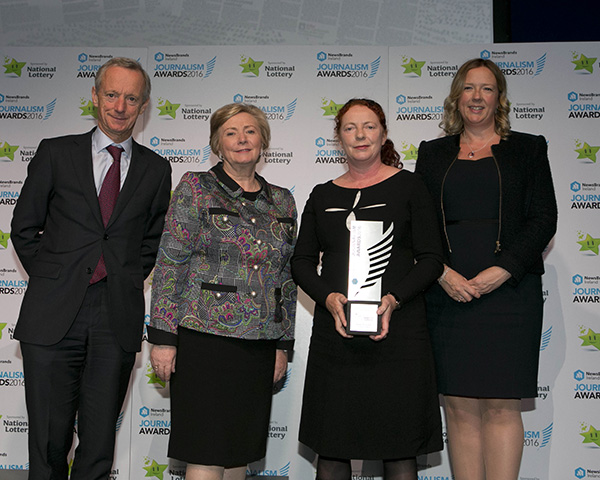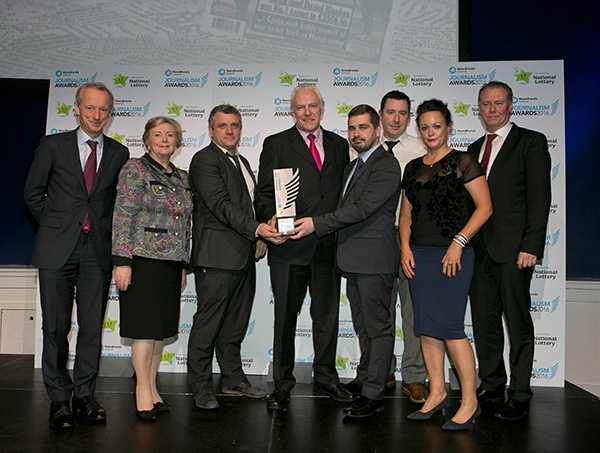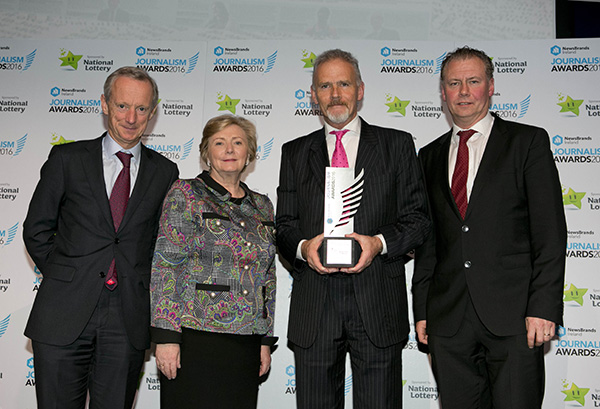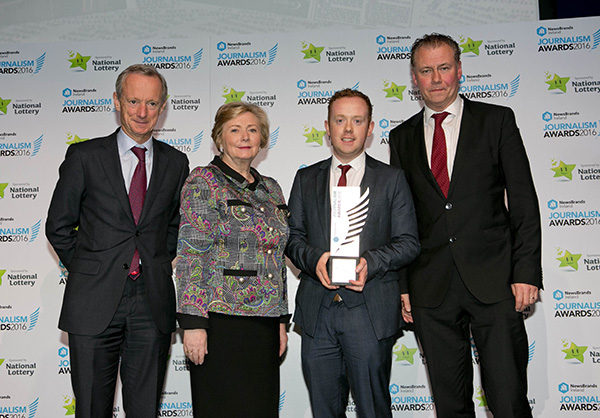
Judges citation: For the past eight years, the task facing our business journalists has been akin to that of economic archaeologists: theirs is the job of sifting the dust and picking through the fossils to establish how the great beasts who once bestrode the Irish landscape, pausing only to graze in the Galway Tent, became extinct overnight.
What was it that wiped them out – an unforeseeable Act of God, like a meteor strike or the collapse of Lehman Brothers, or was it that their brains were just too small? And, more to the point, how do we stop them coming back to life and devouring us all?
Steering us through this Jurassic drama has been the Prof. Alan Grant, maybe even the Indiana Jones of the economic archaeologists, whether he's excavating the ruins of David Drumm's career or dusting off the papyrus that Brian Cowen relied on when he issued the bank guarantee, the Business Journalist of the Year is Tom Lyons of the Sunday Business Post.

Judges citation: Ordinary people, Enda Kenny memorably said before the last election, don’t understand economic jargon.
As he found out, however, it’s not that ordinary folk don’t get it – it’s that they are wary of the ever more guileful terms concocted by economists and politicians to obscure inconvenient truths.
But when a term is as clear and as evocative as ‘vulture fund’, not even the ordinary people have any difficulty in grasping it. Especially when, as in this year’s Business Story of the Year, ordinary people were the very ones to feel its effects.
Last March, 200 families in a West Dublin estate, who had raised funds to set up a school and a GAA club in their midst, learned by letter that they were no longer part of a thriving community – instead they were the subjects of a profit-sharing agreement between their landlords and a Goldman Sachs vulture fund.
For his account of the plight of those families and the deal that now sees them facing eviction, Fearghal O’Connor wins the award for Business Story of the Year.

Judges citation: The award for broadsheet Columnist of the Year goes to a writer whose commentaries and analysis are invariably grounded in careful research and inquiry. They are distinguished by their sharp insight and their balanced judgment. They are presented in a writing style that is strong, courageous, lucid and accessible. They are always constructed on a solid factual framework and the distinction between fact and opinion is always made clear.
This columnist uses sources skilfully and is meticulous in protecting them even when his work is challenged. The range and variety of his work is extensive, encompassing many issues from sexual equality to rural decline, to politics, to crime, policing and criminal justice. He is an exemplar of considered, thoughtful, researched journalism in an era when these qualities are increasingly rare and often under threat.
The award for broadsheet Columnist of the Year goes to Michael Clifford of the Irish Examiner.

Judges citation: The job of a popular columnist is to speak to the people, speak of the people and speak for the people – a talent that few of us have.
Depending on the topic, they will often rely upon their sense of humour and wit.
At other times, they will share their own personal experiences in a bid to provide fresh insight to readers and another perspective.
And many of them hate the phrase ‘PC’.
Our popular columnist of the year is a man who has shared much with his readers – from Brexit to hospital queues, this man has written about it all. He’s Paddy Murray of the Sunday World.

Judges citation: Crime reporting at the very highest level can be a dangerous business.
These reporters write about, expose, and track down some of the deadliest villains in society.
Over the past year, one journalist in particular has shone a very bright light into the dark corners of the Irish criminal underworld.
She confronted an elusive millionaire drug baron in Germany and oversaw a sting operation on another crime lord in Spain using an undercover reporting team.
And her coverage of the bloody Kinahan-Hutch feud has been second to none.
Week in, week out, she has shown herself to be fearless in tackling the evil drug lords who make life a daily misery for thousands of Irish addicts.
This well-deserved award for Crime Journalist Of The Year goes to none other than Nicola Tallant of the Sunday World.

Judges citation: Who can forget the terrible events at the Regency Hotel that shocked the country in February?
The amazing photos of two men, one in drag, the other in a flat cap running armed from the hotel, went around the world.
The accompanying article carried, in great detail, the horrific shooting at the boxing weigh-in.
The journalist and his photographer both had an assault weapon pointed at them by one of the heavily armed gunmen.
Some might say it was a case of luck, and being in the right place at the right time. But a really good reporter makes his own luck.
For this really top class exclusive, the award for Crime Story of the Year goes to Alan Sherry of the Sunday World.

Judges citation: The nominees in the category could come from a wide variety of disciplines – from theatre to television, and from cuisine to culture to cars. The shortlist showcased both great writing, a great understanding of their subject, and wonderful opinions. The winner, however, in this category understood both the context and the content of the subject and had an uncanny ability to place the articles within the wider cultural zeitgeist. The writing was witty, thoughtful and very, very smart.
A critic must be able to inform and entertain; to outrage and enlighten; to find humour in the serious, and seriousness in the humour. Nobody did this better than Patrick Freyne of The Irish Times.

Judges citation: The shortlist for the Digital Innovation Award was very strong. We at FuJo were delighted to see so many strong entries, many of them involving teamwork and real innovation.
The entire shortlist involved some real innovation, not only for each particular title but also more generally. All the shortlisted packages were likely to capture people’s attention, hold them on the site and draw them into interacting with the site. Thus, they bring added value for both the brand and the consumer.
The decision on the winner was close but ultimately the judges decided on The Irish Times’ 1916 entry as the winner.
This was a multi-faceted project that combined many formats utilising The Irish Times’ own archives as well as new original work and material from the Bureau of Military History. There were large amounts of text but these were skilfully deployed and the entry also made excellent use of imagery and video.
In addition, it included a number of interactive digital elements which told the story of 100 years ago in a multi-media and mobile first environment. The interactive tour of the Proclamation was innovative, yet simple. The slider tool featuring then and now pictures of archived photographs and equivalent modern day images was an original and interesting idea. Another noteworthy idea was an interactive map of the places of the Rising. The project also produced a series of original in-house mini documentaries.
Overall this was an excellent package and a real winner not only in terms of content and style but also functionality and engagement.

Judges citation: Among the topics covered over the past year by our winner were the closure of rural garda stations, the murder trial of Graham Dwyer and the tragic and lasting legacy of an IRA bomb. Despite the varied nature of these topics, in each case the writer went behind the headlines, or strayed from the news agenda altogether, to give readers a story about people.
Where the closure of garda stations may seem to some a story about the allocation of resources, we were instead introduced to rural communities living in fear. In the case of a grim and salacious murder trial, we were painted a heart-rending picture of the devastation caused to one of the crime’s forgotten victims – the wife of the killer. And as the worst horrors of the Troubles slowly become history, we were reminded of the families who have lost too much to forget.
For bringing us these stories, and in each case for them being characterised by sensitivity, humanity and by excellent writing, the winner of the Popular Features of the Year category is Catherine Fegan of the Irish Daily Mail.

Judges citation: Health is among the more difficult and sensitive subjects a journalist can tackle. For those suffering with health problems or their families to tell their stories requires a great deal of trust.
Our winner was able to secure an exclusive interview with a woman at the centre of a landmark trial over assisted suicide. This became a story not only of legal travails, but also of friendship and loss.
Separately the families of those who committed suicide opened up in way to reveal not only the hurt caused by the act itself, but also to candidly talk about their interaction with the health services. And the much-vilified health service itself came in for scrutiny that managed to be forensic without losing sight of the sacrifices being made by those providing services on the frontline.
For bringing us these stories in a manner that was both authoritative and moving, the winner of the Broadsheet Features of the Year category is Susan Mitchell of the Sunday Business Post.

Judges citation: The role of the foreign correspondent may have its glamorous side, but there are downsides and dangers too. It’s perhaps a little like being a diplomat without diplomatic immunity.
The journalist isn’t always reporting from the relative civilisation of the world’s great centres of power, though trying to make sense of the forces that can shape all our lives imposes its own particular burdens. Conveying accurately a sense of how daily life is lived at any or all levels of a different society is another challenge.
The riskiest assignments of all are perhaps not imposed on, but chosen by, journalists who have a particular feeling for the extremes of human experience. The fate of helpless populations in times of war and flight, the passions that drive others to fight and die, the ostentatious atrocities of those addicted to terror, and the helplessness of people in the aftermath of natural diaster.
This year’s winner is no stranger these situations, having witnessed at first hand the horrors of war in Syria and the terror inspired by the Ebola crisis in Sierra Leone.
The first Irish journalist into Kathmandu after the devastating earthquake of May 2015 wrote movingly of the plight and courage of the people of Nepal, bereaved, traumatised and homeless in the earthquake’s aftermath, and returned a year later to write about the children of that country, some 30,000 of whom every year will fall victim to slavers and sex traffickers.
For the second time in two years, the winner of the Foreign Coverage award is Jason O’Brien of the Irish Independent.

Judges citation: What makes a great front page? It’s one that screams out to the reader: Buy Me – because I’m the only show in town!
The Herald’s front page of February 6 2016 did just that – with knobs on. It’s a jaw-dropping exclusive picture of the Regency Hotel killers, dressed in Garda gear and armed to the teeth, carrying out one of the most shocking and audacious crimes of the year.
The picture is the story, and it is rightly given a big, bold treatment with a simple, straight-forward headline that doesn’t detract from the astonishing image.
This is a sensational front page telling a sensational story.

Judges citation: The art of headline writing is diverging between print and digital. An iconic turn of phrase which lifts a newspaper story can sink without trace in the unforgiving algorithms of Search Engine Optimisation.
Our Headline of the Year winner is unashamedly rooted in newsprint and is amplified by brevity and its juxtaposition with compelling photographs from a newspaper which has produced some of the most memorable headlines of the past 50 years. While it demands a certain knowledge of street slang from its readers, it underlines the famous dictum of Northcliffe that while “reporters write the paper; sub-editors make it”.
The winner for its description of a drug-snorting priest goes to the Irish Sun for an attention-grabbing single decker — “Charlie Chaplain”.

Judges citation: The outlook for traditional media in Ireland, we are repeatedly told, is bleak. At the same time, it is proclaimed that the media is not objective when it comes to reporting upon itself.
Certainly, there is no denying the financial pressures and constraints under which everyone in this room — and those back in the newsroom — labour.
Nor can there be any argument that the ubiquitous threat of expensive litigation here adds another layer of risk to journalism which relies on disclosure to help the public, and thereby the wider democracy, to understand what is happening in society and who exercises the levers of power.
Today’s winner in the investigative reporting category demonstrates that opportunity and defiance remains still for those newspapers prepared to grasp it.
In 15,000 elegantly written and diligently researched words, our winner traces a narrative arc worthy of a John Le Carré thriller, which encompasses three continents, high finance and black ops, with walk-on parts for former members of MI5, MI6 and the FBI.
It takes us intriguingly into matters of technology, legal argument and business strategy with a clarity of style and honesty that can only be applauded.
For demonstrating the power of long-form journalism to unravel and explain complexity and secrecy, this year’s award in the investigative category goes to the richly deserving Peter Murtagh of The Irish Times for his series on Denis O’Brien and the Red Flag case.

Judges citation: The news analysis category is for journalism which provides in-depth coverage of the stories and issues affecting the lives of readers and society at large, adding significantly to our knowledge and understanding of events.
It often requires considerable, additional work. This year’s winner did that while addressing difficult topics and human stories of loss, struggle and injustice.
The winner combined exceptional reporting skills with a journalistic determination to delve deeper and go further to get at the truth at the heart of complex issues. The work is underpinned by outstanding writing and powerful storytelling, compelling readers all the way to the last paragraph of often lengthy and challenging reads.
The 2016 news analysis award goes to Rosita Boland of The Irish Times.

Judges citation: News reporter of the year was one of the most keenly contested categories in this year’s awards, confirming once again that the news reporter remains the lifeblood of journalism.
Great news reporters remain among the most valued by editors and news desks. They are the ones we reach for first when the big story breaks, the first at the scenes of some of the most demanding and difficult stories we cover. They are the ones with the talent, the initiative, the contacts, the determination and cunning to be first, fast and accurate with the stories that matter to readers.
This year’s winner has a body of work that exemplifies all those great traits of the reporter’s craft. The news reporter of the year is the Sunday World’s Patrick O’Connell.

Judges citation: The winner of the political reporter category is a person who went against prevailing wisdom to accurately predict the shape of the Irish political landscape after the election last February.
Six months before the election, when many others were certain that a coalition between Fine Gael and Fianna Fail was on the cards, he analysed the opinion polls and wrote: “At this remove from polling day, I now believe the most likely outcome will be a Fine Gael minority government supported by Fianna Fail in a slightly more formal arrangement”.
His journalism is essential reading every week, being consistently well informed and thought provoking. So, for his political acumen, for sticking to his guns and for being in possession of a crystal ball that actually works, the Political Journalist of the Year is Jody Corcoran of the Sunday Independent.

Judges citation: Looking back on the election campaign, there is one story and one quote from that story stands out from the crowd.
“Power is a drug… it suits me.”
These words and other equally memorable ones were uttered on a campaign walkabout by the former Minister for the Environment, Labour’s Alan Kelly.
They were said in response to a query from a reporter who possesses that enviable knack of eliciting jaw-dropping quotes and previously unreported information from her subjects.
For a powerful interview, one that tore up the rulebook of traditional political journalism and got everybody – inside and outside of politics – talking, this year’s Political Story of the Year goes to Niamh Horan of the Sunday Independent.

Judges citation: Every journalist wants the exclusive, the front page splash. However, few stories can get the nation talking and lead the news agenda for weeks – as our next winner did.
Like something straight out of Hollywood, this story had it all – crime, murder, power, and fear. And so for their exclusive coverage of the Regency Hotel killing, the winners of the Scoop of the Year goes to – The Sunday World. (Sunday World Crime Team)

Judges citation: Good showbiz journalism satisfies the nosy neighbour in us all. It gives readers a glimpse into the sometimes scandalous, sometimes tragic, always glamourous lives of celebrities. A great showbiz journalist walks the tricky line between maintaining often very genuine friendships with their subjects whilst also reporting on their lives.
For an extensive body of work doing just that, the showbiz journalist of the year is Ken Sweeney of The Irish Sun.

Judges citation: Great showbiz scoops not only entertain but relay stories of extraordinary human interest. For her piece about Georgia Penna’s journey through surrogacy, the showbiz story of the year goes to Maeve Quigley of the Irish Daily Mirror.

Judges citation: For many people, the sports section of their newspaper is the first part they turn to.
They want to be informed and updated on the previous day’s action. But they also want the inside track, that extra piece of wisdom that they can tell their pals over a coffee or a pint.
The good sports journalist possesses all these attributes but some writers go further. There are some names that readers are confident they can rely on for the big scoops that are written in an intelligence and entertaining style.
This year’s winner is one of those names, someone who can break the story and whose writing style is instantly recognisable because of its insight and clarity.
Meticulous research went into this year’s Sport Story winner, the ramifications of which rumbled on for months.
The winner of Sport Story is Vincent Hogan of the Irish Independent.

Judges citation: Sports writers are a rare breed. They know their sports inside out and have an almost encyclopaedic knowledge which they share with their readers through their writing.
But sports fans demand more than just knowledge. They want the facts but also that behind-the-scenes take that only a few possess.
This year’s winner is one of the most recognisable names in sports journalism. His weekly column is a must for those wanting his views that are based on years of expertise.
But it is the way that he conveys his message that has won him legions of readers.
It is colourful, thoughtful and probing.
The Sports Writer of the year is Neil Francis of the Sunday Independent.

Judges citation: Our final category is Young Journalist of the Year.
This year’s exceptional entries in the Young Journalist category demonstrate that we have a wealth of emerging talent we can be proud of.
With a flair for storytelling, this year’s winner penned a series of hard-hitting, in-depth and often poignant articles.
And so, it is my pleasure to announce the Young Journalist of the Year is Sean Dunne of the Irish Daily Mail.

Judges citation: The difficulty of deciding on Journalist of the Year is that you are not just comparing apples and oranges: you’re comparing both of them with all sorts of other exotic fruit. Features and news, broadsheets and popular papers, scoops and series, sports and crime, columnists and reporters – they are all in the mix, and properly so.
That said, I think that the person who emerged from this process as the overall winner is a journalist who has demonstrated that – although he is a winner in one particular category – he would be equally at home in several others. This is because in everything he does – commentary, analysis, exposés – he is driven by the three basic characteristics of good journalism in any paper, on any topic, and in any age: evidence, accuracy, and fair-mindedness. And good writing, of course – that goes without saying.
I have therefore great pleasure in announcing that the award of Journalist of the Year 2016 goes to Michael Clifford of the Irish Examiner, whose winning portfolio in the Broadsheet Columnist category exemplified his personal strengths and that of his paper.
























